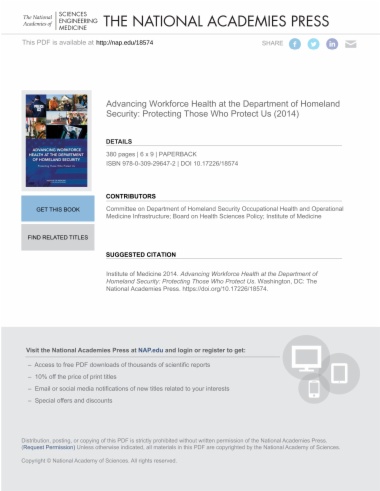

The more than 200,000 men and women that make up the Department of Homeland Security (DHS) workforce have been entrusted with the ultimate responsibility - ensuring that the homeland is safe, secure, and resilient against terrorism and other hazards. Every day, these dedicated individuals take on the critical and often dangerous challenges of the DHS mission: countering terrorism and enhancing national security, securing and managing the nation's borders, enforcing and administering U.S. immigration laws, protecting cyber networks and critical infrastructure, and ensuring resilience in the face of disasters. In return, DHS is responsible for protecting the health, safety, and resilience of those on whom it relies to achieve this mission, as well as ensuring effective management of the medical needs of persons who, in the course of mission execution, come into DHS care or custody.
Since its creation in 2002, DHS has been aggressively addressing the management challenges of integrating seven core operating component agencies and 18 supporting offices and directorates. One of those challenges is creating and sustaining a coordinated health protection infrastructure. Advancing Workforce Health at the Department of Homeland Security examines how to strengthen mission readiness while better meeting the health needs of the DHS workforce. This report reviews and assesses the agency's current occupational health and operational medicine infrastructure and, based on models and best practices from within and outside DHS, provides recommendations for achieving an integrated, DHS-wide health protection infrastructure with the necessary centralized oversight authority.
Protecting the homeland is physically and mentally demanding and entails many inherent risks, necessitating a DHS workforce that is mission ready. Among other things, mission readiness depends on (1) a workforce that is medically ready (free of health-related conditions that impede the ability to participate fully in operations and achieve mission goals), and (2) the capability, through an operational medicine program, to provide medical support for the workforce and others who come under the protection or control of DHS during routine, planned, and contingency operations. The recommendations of this report will assist DHS in meeting these two requirements through implementation an overarching workforce health protection strategy encompassing occupational health and operational medicine functions that serve to promote, protect, and restore the physical and mental well-being of the workforce.